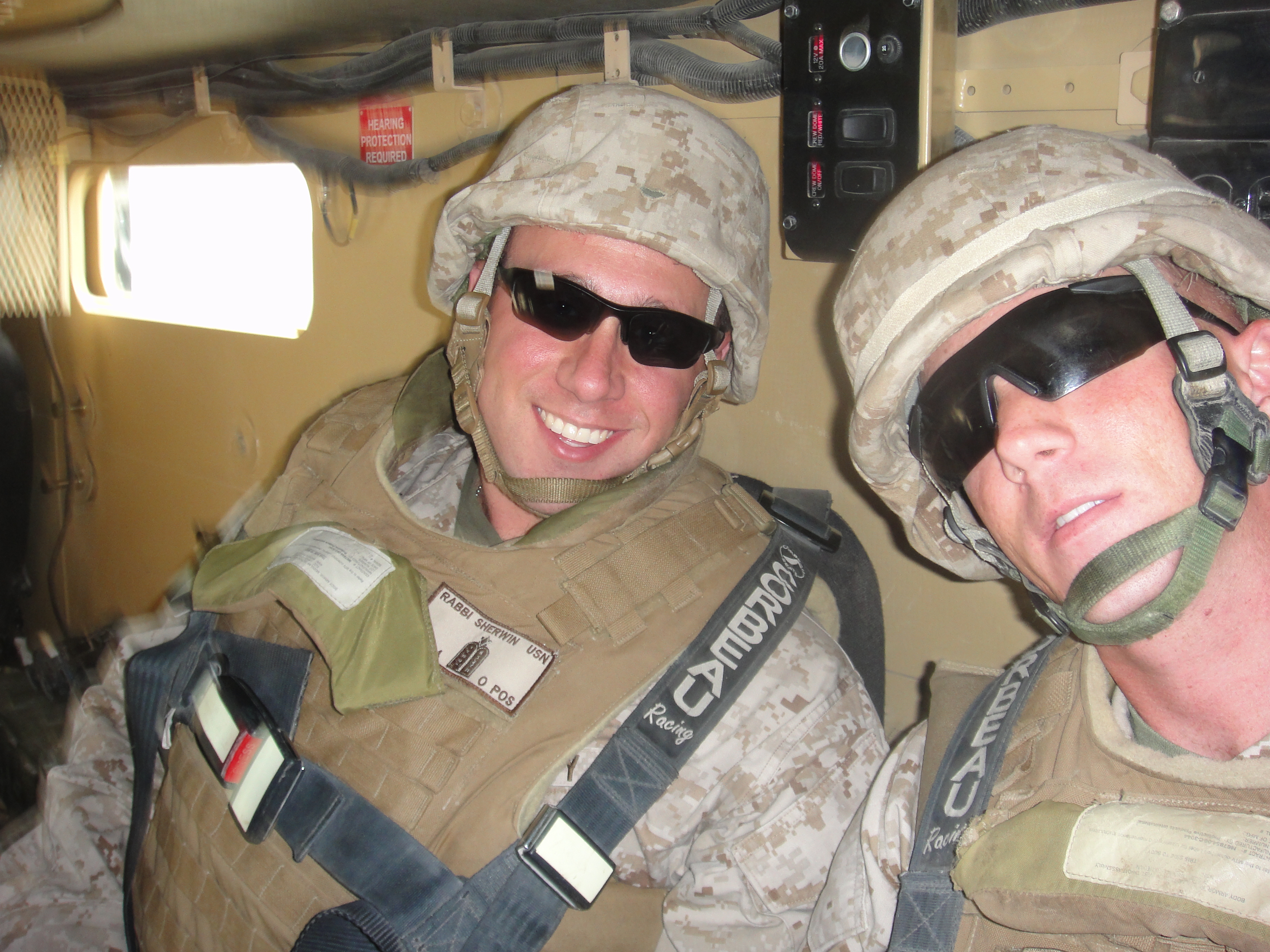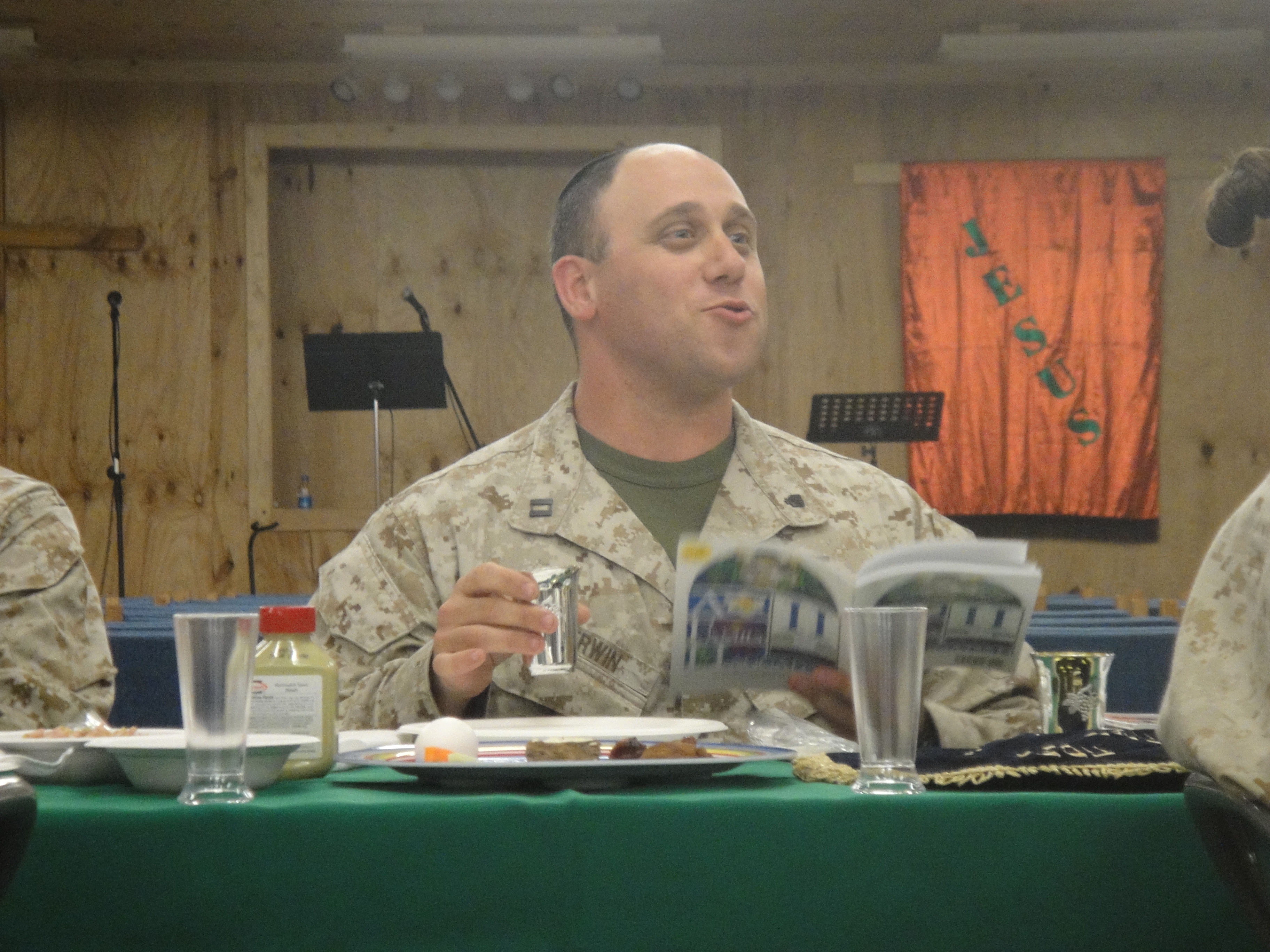By Joshua Sherwin, United States Naval Acaedmy, Annapolis, MD

Born in Chattanooga, Tennessee where his father had his first pulpit, Josh was unsure of what type of rabbi to b
Wriggling in the Mud
Following ordination Josh took a very different path from his classmates. He was commissioned as a Lieutenant Junior Grade on active duty, and spent the next 3 years at Camp Lejeune working with the United States Marine Corps participating fully in every aspect of military life. As the Headquarters Battalion Chaplain, he was the sole chaplain responsible for the spiritual wellbeing and morale of over 2400 Marines, sailors, and their families, and he was often found participating in the Marine Corps Martial Arts Program (earning his black belt in the process), on 10 plus mile battalion hikes, teaching the Operational Stress Control And Response course, and experiencing “More than my share of wriggling around in the mud.”During his time with the Marine Corps, Josh not only worked with the Marines of Camp Lejeune, but also deployed three times to Afghanistan, spending Passover there in 2010 and 2011, as well as the High Holy Days in 2011. While there, he spent his time travelling throughout the Helmund province, riding convoys, helicopters, and cargo planes to visit Jewish service-members at many of the Forward Operating Bases throughout the area.
Following the conclusion of his assignment at Camp Lejeune, Josh’s next set of orders sent him to Annapolis, MD to serve as the Rabbi for the Naval Academy. When asked why he chose military service, Josh answered that he is “In it to be a rabbi, a chaplain, and to support our men and women who are in need wherever they may be.” And while as a Rabbi he “cares for the many young Jewish men and women who are far away from home and don’t have access to rabbis in any other way,” his mission is not just to serve Jewish Service-members. Every Navy Chaplain learns in training that while you are foremost responsible for a member of your own faith group, the mission of naval chaplains is to “Provide (for your own), facilitate (for others), and most importantly, to care (for all)“.
Life at Annapolis
Josh proudly describes the atmosphere at Annapolis as “incredibly supportive and pluralistic” with every faith tradition represented. Although the Naval Academy is the last of the service academies to have “noon meal prayer” every day at lunch (Josh‘s day is Thursday), he sees it as an opportunity to experience different religious perspectives and notes that each chaplain begins with the statement “I invite you to pray with me” so that no one is compelled to pray against his or her wishes.
One of the highlights of his experience at the Naval Academy is the opportunity to take 30 midshipmen to Israel for ten days over spring break, a program that was recognized by the National Bible Association who awarded Josh the 2013 Witherspoon Award for excellence in Chaplaincy (an award given to only one Chaplain from each branch of the armed forces per year). This annual trip is unique to the Naval Academy in that it is an interfaith trip that is “one part faith experience, one part military experience, and one part spring break.” Israel, after all, is an educational experience and “both politically and strategically important no matter what your faith background.” He has taken a Baptist chaplain and a Jewish Naval Aviator along on past years’ trips, and the Midshipmen are required to attend prep sessions taught by Josh and other Chaplains that focus on the meaning of Israel in their respective religious traditions, and on the state as a modern, thriving country.
The trip includes all the “typical stuff” - Jerusalem, Tel Aviv, the Dead Sea and Masada with more time in the north - Nazareth, Golan Heights, K’far Nahum, a visit to a naval base in Haifa, tour of a gunboat and briefings by a naval attaché. The interfaith aspect created a different experience than any other of his other Israel experiences: reading the Sermon on the Mount on the actual Mount with religious Christians, visiting the spot on the Sea of Galilee where Jesus is said to have walked on the water, allowing those participants who desired to become baptized in the Jordan River where John the Baptist is said to have performed his immersions, and visiting the Temple Mount and Dome of the Rock in addition to the Jewish sites and experiences he saw in previous trips. He describes the shocked reaction of the Midshipmen in the group when they realized how small and green Israel is, how close all the places are to each other, how close Syria is to the Golan, and how everything there is tied directly to biblical history.
What’s next? Well, it’s said that you “join the Navy to see the world” and next summer Josh will be concluding his assignment at the Naval Academy and will be moving to be the Chaplain aboard the USS Comstock, an amphibious support ship out of San Diego. His long-range plan? “I’m going to stay as long as it’s fun”. What a fascinating way to be a fourth generation rabbi!!

Add new comment